With two mountain ranges that stretch across the country, Alborz Ranges and Zagros Ranges, Iran blesses mountain lovers with a great diversity of peaks and routes. This budget trekking destination enjoys a +5000 giant and a collection of +4000 peaks, each with its own unique features and beauty. Like to find out about the top ten +4000 mountains of Iran, from the altitude and best trekking season to the popular routes and technical information? We’ll first get to know the most famous of them: Mount Damavand, Mount Alam Kuh, and Mount Sabalan. Then we’ll move on to the southern mountains: Hezar Mountain and Dena Mountains. After that we’ll explore Sialan Mountain, Zard Kuh, Oshtorankuh, and Shirkooh. And we’ll finally get to know southeast Iran’s Taftan Mountain. So, here is your guide to the Top Iran Mountains…
Contents
- 1 Top Iran Mountains: Mount Damavand
- 2 Top Iran Mountains: Alam Kuh
- 3 Top Iran Mountains: Mount Sabalan
- 4 Top Iran Mountains: Hezar Mountain
- 5 Top Iran Mountains: Dena Mountains
- 6 Top Iran Mountains: Sialan Mountain
- 7 Top Iran Mountains: Zard Kuh
- 8 Top Iran Mountains: Oshtorankuh
- 9 Top Iran Mountains: Shirkooh
- 10 Top Iran Mountains: Taftan Mountain
Top Iran Mountains: Mount Damavand
On top of the list of top Iran Mountains is definitely Mount Damavand (5610m). As Iran’s highest summit and Asia’s highest volcano, this magnificent mountain has been on the bucket list of every Iranian trekker. Located in the north of Iran, this trekking destination is a potentially active volcano with a lot of hot springs on its southern face. The conical shape of Mount Damavand reminds you of Japan’s Mount Fuji.
Looking for experiencing a great trek on a +5000 summit? Then Damavand is a great choice! The reason is that it has routes that are ascendible with an average technical level. Plus, the unique nature of Damavand and the different shelters and facilities there make it one of the most fascinating summits in Iran. You can reach Damavand summit from three faces: southern, northern, and northeastern. Need more practical information about Mount Damavand? Check out All You Need to Know About Mount Damavand then.
Altitude: 5610 meters
Province: Mazandaran
Mountain Range: Alborz
Summit Routes: south face, north face, and northeast face
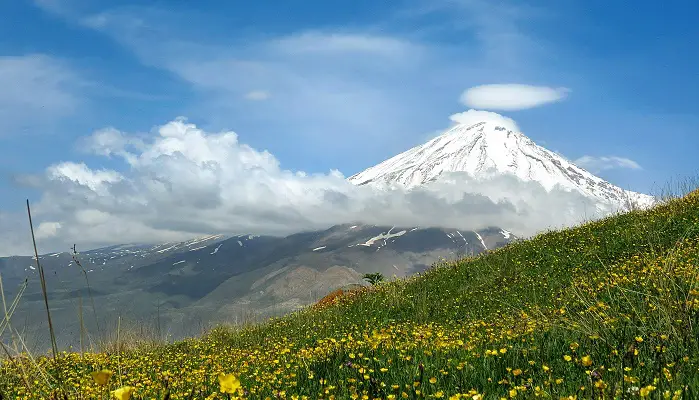
Mount Damavand Tours
Mount Tochal and Mount Damavand Trek
Sabalan Mountain, German Ridge & Mount Damavand Tour
German Ridge and Mount Damavand Climbing Tour
Summit Mount Damavand at Your Own Pace
Adventures on Mount Damavand & Reghez Canyon
Zard Kuh Mountains & Mount Damavand Trek
Trekking on Sialan and Damavand
Conquering Sabalan and Damavand
Mount Alam Kuh & Mount Damavand Trek
Mount Damavand South Face Trekking Tour
Horseback Riding Tour Around Mount Damavand
Mount Damavand Ski Mountaineering
Ski Touring on Damavand & Doberar
Top Iran Mountains: Alam Kuh
Alam Kuh, Iran’s second highest mountain (4850m), is in the middle of a picturesque region in northern Iran: Tekht-e Soleyman. On the northern face of Alam Kuh, there is a massive big wall that includes the country’s most technical and difficult rock climbing routes. This wall has won Alam Kuh the title of the K2 of Iran among climbers.
The existence of a variety of routes on Alam Kuh has turned it into a great trekking and wall climbing destination for mountaineers of various tastes and capabilities. So, Alam’s ascent routes are of two kinds: trekking routes, and rock climbing routes. Rock climbers may pick the big wall or flank routes. And trekkers can choose between Hesarchal and Siahsang routes of this top Iran Mountain. The scenic Hesarchal, which is in fact the southern face route, is the least challenging one for conquering Alam. The more difficult Siahsang route is in fact one of Iran’s most challenging trekking routes. The high scrambling requirement makes this route only suitable for mountaineers of high expertise. Find a climbing guide for these routes at Hesarchal Route Trekking Guide, and Siah Sang Route Trekking Guide.
Altitude: 4850 meters
Province: Mazandaran
Mountain Range: Alborz
Summit Routes: Southern face (Hesarchal), Northern face (Siah Sang), the Northern Big Wall, the German Ridge
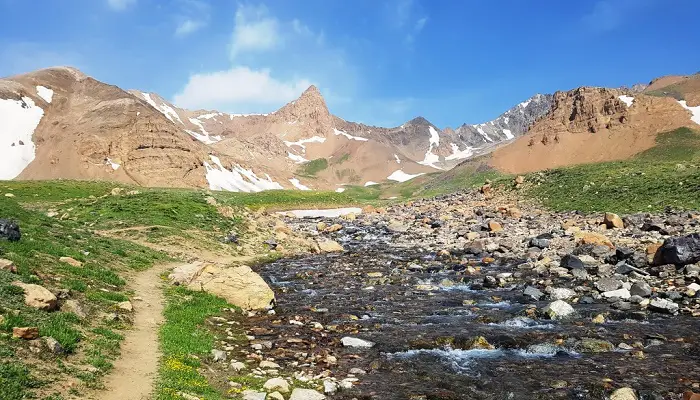
Mount Alam Kuh Tours
Sabalan Mountain, German Ridge & Mount Damavand Tour
German Ridge and Mount Damavand Climbing Tour
Mount Alam Kuh & Mount Damavand Trek
Trekking on Mount Alam Kuh - Hesarchal Route
Rock Climbing on Mount Alam Kuh Big Wall
Germans Ridge Rock Climbing Tour - Mount Alam Kuh
Hike to Alamut Castle & Summit Sialan Mountain
Top Iran Mountains: Mount Sabalan
Next on the list of top Iran mountains, the attractive Mount Sabalan (4811m), Iran’s third highest mountain after Damavand and Alam Kuh, lies in northwest Iran. Sabalan is a semi-active volcano that features an adorable lake on its highest peak, Soltan Peak. This lake is frozen over during the major part of the year. Sabalan’s beautiful nature and the multiple hot springs on its foot make this top Iran mountain not only a perfect trekking destination, but also a great place for other sports and pleasures. To ascend Sabalan, you can choose from its 3 main routes: 1. The southern face route. 2. The western face route. 3. The northeastern route. The northeastern route is the most common route for conquering Mount Sabalan. Also, for your first ascent, you’d better pick the northeastern route. Because this route is easily distinguishable. You may also get a ride to the shelter on a 4WD.
Altitude: 4811 meters
Province: Ardabil
Mountain Range: Alborz
Summit Routes: Southern face, Western face, the Northeastern face
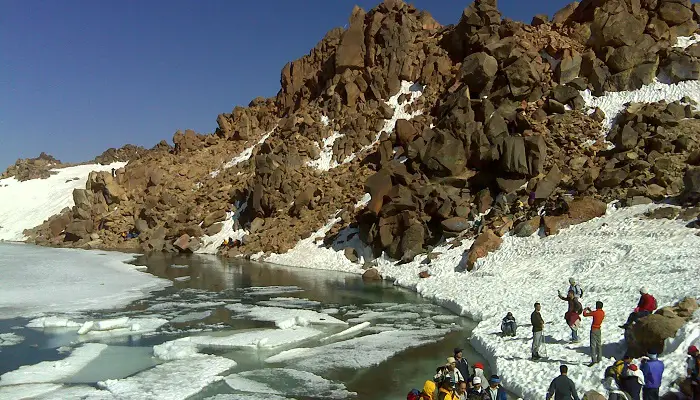
Mount Sabalan Tours
Mount Sabalan Trek - South Face Route
Sabalan Mountain, German Ridge & Mount Damavand Tour
Conquering Sabalan and Damavand
Mount Sabalan Trek- Northeastern Face
Top Iran Mountains: Hezar Mountain
Hezar (or Hazaran) Mountain (4510m), a handsome mountain in southern Iran, is the highest summit in Kerman Province. Because of its long distance from the center of the Earth, this summit is recorded as the lowest gravity point in Iran. Plus, the plant diversity of Hezar has won it the name Hazaran (meaning thousands). Depending on your plan and your physical and professional capacity, summiting Hezar Mountain can be an intensive 1-day plan, or a one and a half-day plan. There are various routes to reach Hezar peak: 1. Mirshadi 2. Babbini 3. Ordikan 4. Babzangi (the shortest route) 5. Zarrood (the easiest and most popular route, that is also equipped with a shelter)
To summit Hezar Mountain through its most commonly taken route, Rayen Route (on the northern face), you’ll have to find your way to Rayen (a town 115 km to Kerman). The route begins near Rayen waterfall (2850m). Then signs lead you through the route. These signs are in Persian and might not be practical enough. But at least they ensure you that you are on the right track. So, a few hours of hiking will take you to Hezar Shelter (3200m). You can find potable water near the shelter and a few other points before the shelter. After passing the shelter, at an altitude of 4000 meters, you’ll reach a milestone of the route: Taj Khoroos Rock. After this rock, you’re there: Hezar Summit! The best season to climb Mount Hezar is mid-May to mid-October. Hezar is also summitable in winter. But note that it is very snowy and it has an unpredictable weather.
Altitude: 4510 meters
Province: Kerman
Mountain Range: Zagros
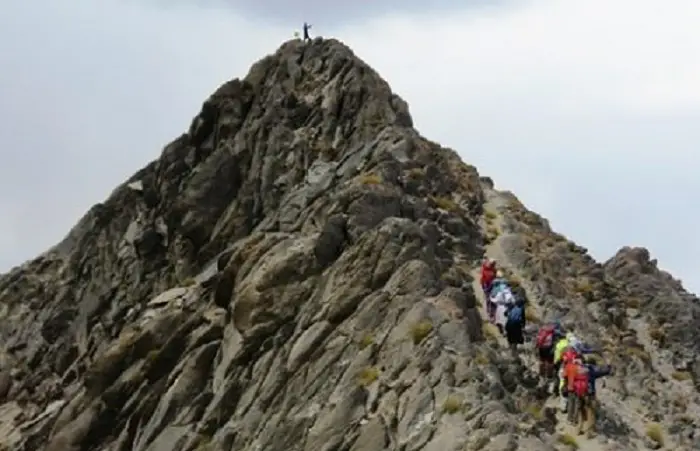
Top Iran Mountains: Dena Mountains
The considerable length, the diversity of peaks and trails, the abundance of water, and the unique vegetation make Dena Mountains a great destination for a multi-day trekking experience in southern Iran. The massive Dena Mountains stretch for 80 kilometers in the heart of Zagros Mountains. This mountain range has over forty +4000 peaks, stretching from northwest to southeast.
Dena Mountain Ranges include the central, northwestern, southeastern, and bypath regions. Each of these regions enjoys several +4000 peaks. Dena’s highest peak, Ghash Mastan or Bizhan 3 (4300m), is in the central region. From Dena Mountains’ other top peaks, Hoz Dal, Kalkharman, Ghalam, Morgol, Pazan-e Pir, Bizhan 1&2, Hoz Dal is the most popular for its distinguishable trail and more equipped shelter. Multi-day treks for conquering several peaks requires high capabilities and a familiarity with the routes. The Mountains’ wildlife and plant life is also another attraction of Dena, winning it the status of a protected National Park. Water is also abundant on this top Iran mountain, and in spring and early summer, you can find a spring or fall on each corner. The best season for a trekking adventure on Dena is late spring to early summer, and it has dangerous winters.
Altitude: highest summit: 4300 meters
Province: Kohgiluyeh and Boyer-Ahmad
Mountain Range: Zagros
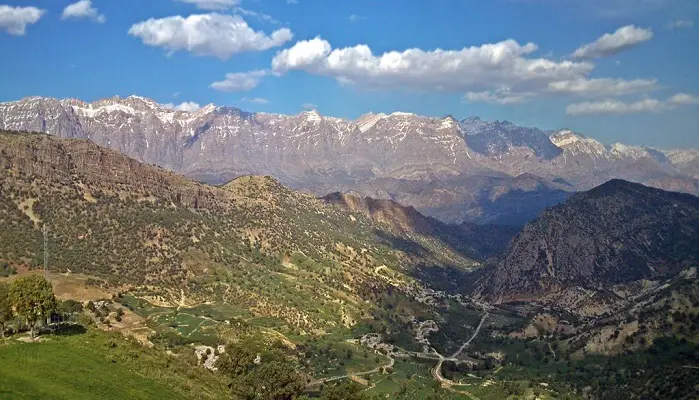
Top Iran Mountains: Sialan Mountain
A 4250-meter beauty in northern Iran! If you are looking for a mountain climbing adventure in a green forest, Sialan Mountain is a great choice. From one side, Sialan reaches the heavenly Daryasar Plain, and on the other, it meets the legendary Alamut valley. Generally, you could summit this top Iran mountain via four routes. The first route, the northern, which starts from Esel Mahalleh Village in Mazandaran province, is the longest and one of the most scenic routes. And the second, the southern, which starts from Haniz Village in Alamut Valley. Depending on which route you pick, you could plan your itinerary so that you can enjoy the lovely nature of Alamut valley (to the south of the mountain) or the Dohezar Jungles (to the north of the mountain).
Altitude: 4250 meters
Province: Mazandaran and Qazvin
Mountain Range: Alborz
Summit Routes: Northern face, Southern face, …
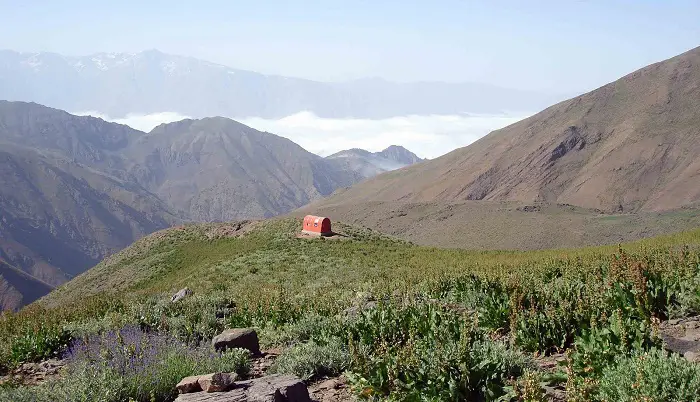
Mount Sialan Tours
Trekking on Sialan and Damavand
Hike to Alamut Castle & Summit Sialan Mountain
Top Iran Mountains: Zard Kuh
Several peaks, unique plants, and flowing springs from one side, and the adorable Bakhtiari nomads who camp there in summer from the other, make Zard Kuh Mountains a special trekking destination.! As part of the Zagros Mountains of southwestern Iran, the multiple peaks of Zard Kuh Mountains are definitely on the list of top Iran mountains. From its several peaks, Kolonchin, Haft Tanan, Shah-e Shahidan, and Cheri are the most popular. The highest, Kolonchin, enjoys a 4200-meter altitude. For summiting this top Iran mountain, you should find your way to Kuhrang, a town in Chaharmahal and Bakhtiari Province. There are deep valleys and high walls on the mountains’ western region that make winter ascents very challenging. I recommend planning your trek so as to have the rare chance of spending time with Bakhtiari Nomads of Iran. Their simple and untouched lifestyle and their sweet hospitality will surely spice up your trek.
Altitude: 4200 meters
Province: Chaharmahal and Bakhtiari
Mountain Range: Zagros
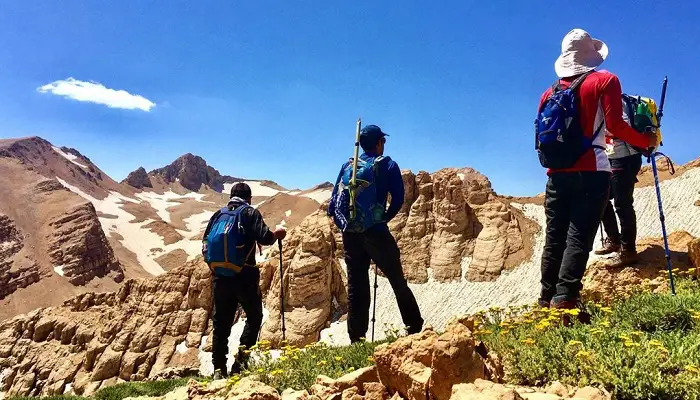
Mount Zard-Kuh Tours
Zard Kuh Mountains & Mount Damavand Trek
Trek on Zard Kuh Mountains
Top Iran Mountains: Oshtorankuh
Oshtorankuh, a mountain range in the east of Lorestan Province, is one of Zagros Mountains’ highest pieces. Of Oshtorankuh’s specialties are its high snow-covered peaks, long and deep valleys, permanent rivers, diverse plant and animal life, and terraced villages. The beauty and majesty of Oshtorankuh shows off from a 100-kilometer distance. Its name, which means the Camel mountain, comes from its eight +4000 peaks which follow one another in a row, like a camel caravan. Oshtorankuh’s highest peak, Sanboran, has a 4150-meter altitude. This top Iran mountain is also home to a jewel: Gahar lake. And it is the source of many rivers. For a mountaineering adventure on Oshtorankuh, make your way to Tian Village in Dorood, Lorestan Province. Depending on your schedule, you’ll spend a night in Golgol Shelter (the base camp) or Chal Kabud Hut (nearer to the summit). The best season for a trek on this mountain is late spring and summer. The winters are too cold and snowy.
Altitude: 4150 meters
Province: Lorestan
Mountain Range: Zagros
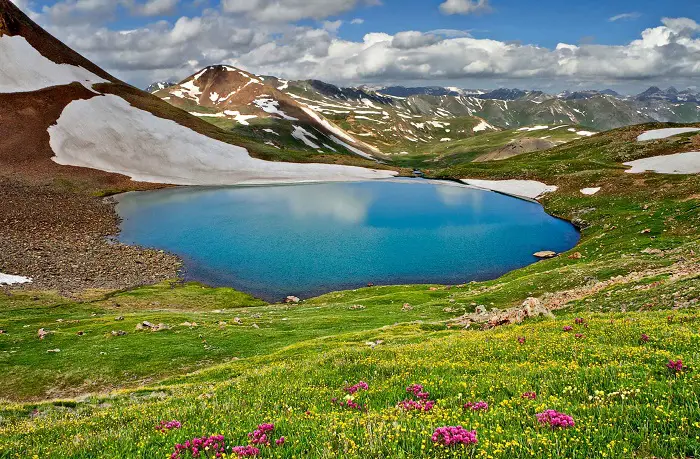
Top Iran Mountains: Shirkooh
In the middle of a vast desert in Yazd province, Shirkooh stands alone as a 4075-meter giant that looks like a sleeping lion. Yet, this highest mountain of Yazd province is a part of Zagros Mountains. If you’re looking for a +4000 summit with an easy or average difficulty level, Shirkooh is a good choice. Why? Because Shirkooh can be summited in one or two days and has a couple of shelters near the ridge. Also, the route enjoys permanent springs that ensure your water supply. Plus, cell phone reception on most points of the route make Shirkooh an accessible mountain. The mountain’s summit routes include Darreh Soosan, Darreh Shams, Labidshir, and Abriz. Abriz has two bypasses itself: Darreh Najib (the more popular one) and Lasergoon. For an adventure on Shirkooh, find your way to the starting point in Dehbala village (2600m) in Yazd’s Taft Town. From there, a few hours of hiking will take you to the shelter (3520m)
On the trail, there are a couple of springs that have water for the major part of the year. There are also signs that can help you through the path. Near the summit, you can find a second shelter. The incredible view of the desert and a few other mountains on top of Shirkuh summit is unforgettable. You can summit Shirkooh all year round, but the best season is spring and fall. The summers are relatively hot and the winters are snowy. However, among winter ascent destinations of the same altitude in Iran, Shirkooh is a nice choice.
Altitude: 4075 meters
Province: Yazd
Mountain Range: Zagros
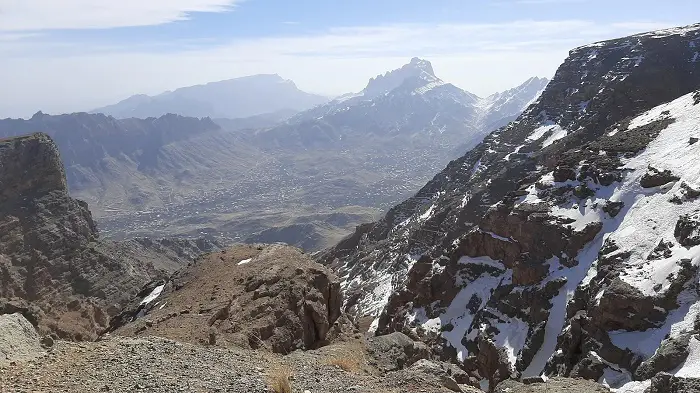
Top Iran Mountains: Taftan Mountain
This volcanic mountain is in southeast Iran, in Sistan and Baluchistan Province. Generally, Taftan enjoys 4 peaks and 3 craters. Its highest summit, Chehel Tan (4042m), has an active crater that sends out sulfur vapors. The name, Taftan (meaning scorching in the local language), indicates the volcanic nature of this top Iran mountain. To summit Taftan, you could take 1. The shelter route (western face) 2. Torshab Village (eastern face) 3. Tamin Village (northern face) 4. Sangan and Khanjak village crossing (northeastern face).
Mountaineers often pick the western face route, which also includes a shelter. To ascent Taftan Mountain through this route, you should find your way to Darreh Gol Village near Khash (170 km to Zahedan). Sobh shelter is in mid-way. It takes around 3 hours to get to the shelter, and from there, around 3 to 4 hours to the summit. You could conquer Taftan all year round, but the best season is spring and fall. Strong cold winds make winter ascents very difficult.
Altitude: 4042 meters
Province: Sistan and Baluchestan
Mountain Range: Zagros
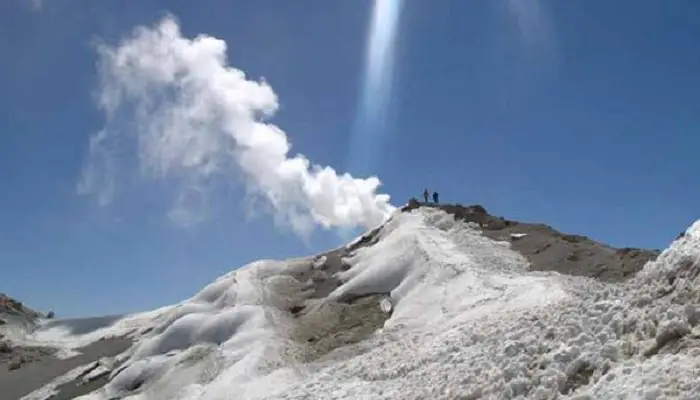


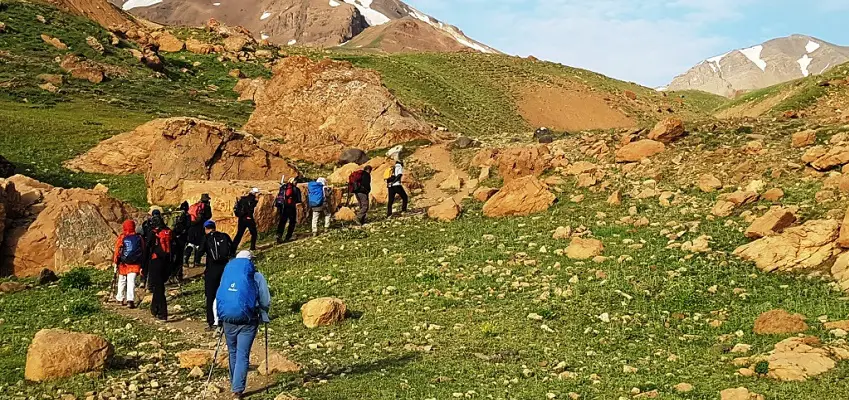
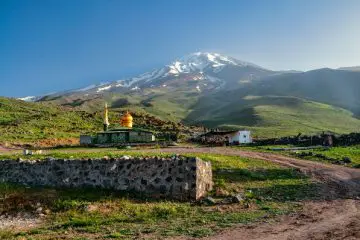
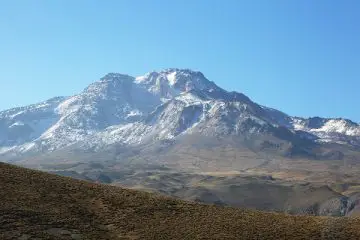
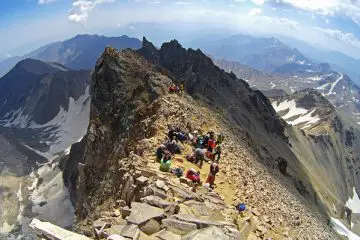
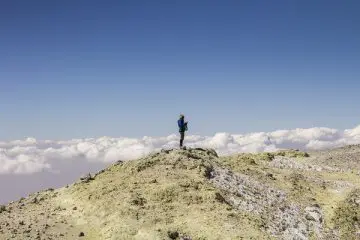
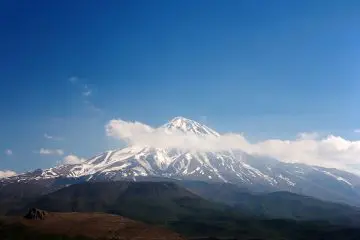
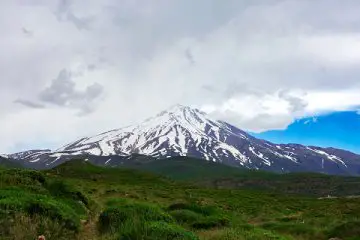
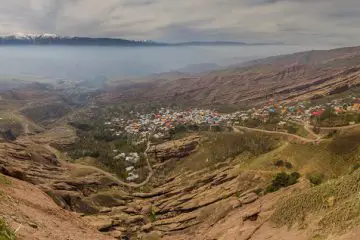
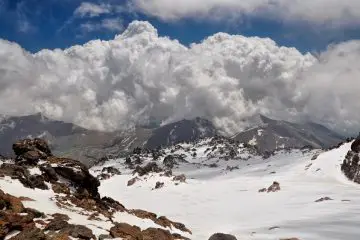
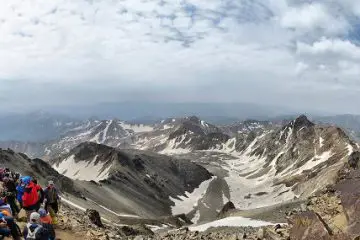
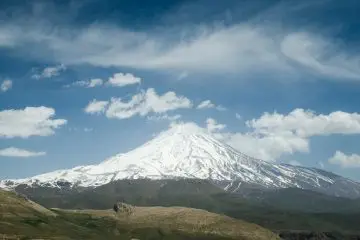
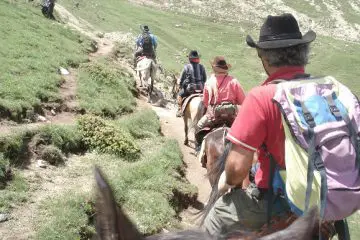
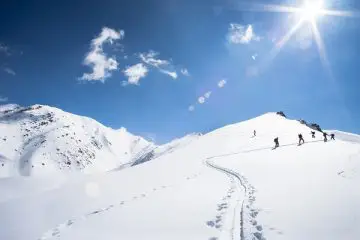
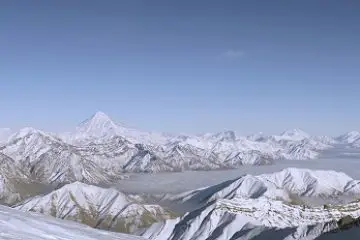
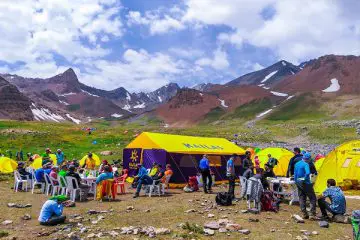
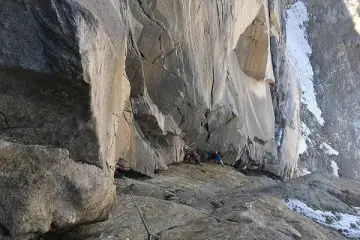
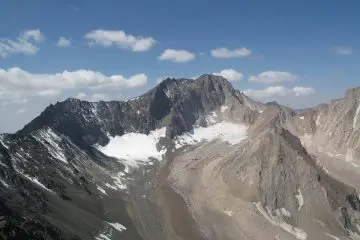
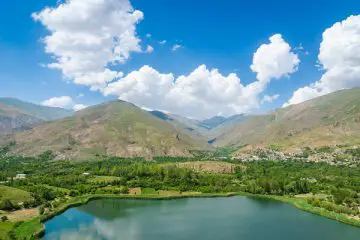
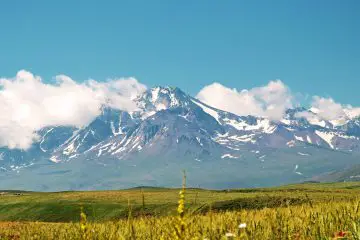
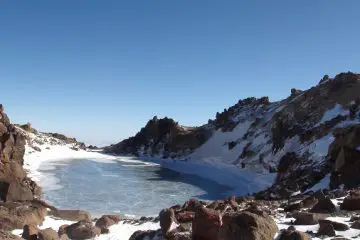
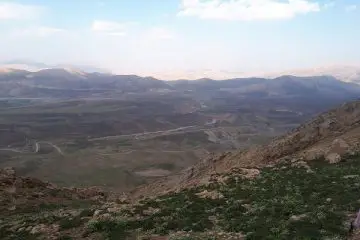


Comments